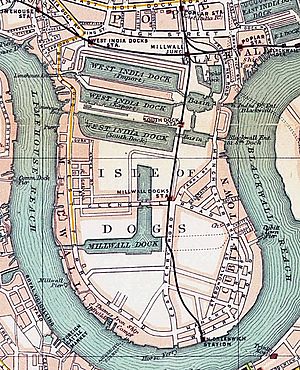West India Docks facts for kids
The West India Docks were a group of three large docks built on the Isle of Dogs in London, England. Docks are places where ships can load and unload goods safely. The very first dock here opened in 1802. These docks were very busy for many years, but they eventually closed for commercial (business) ships in 1980. After they closed, a huge new area called Canary Wharf was built where the docks used to be.
Contents
What Were the West India Docks?
The West India Docks were a big part of London's history. They were built to handle ships arriving from the West Indies, bringing valuable goods like sugar, rum, and coffee. These docks were designed to be very secure, protecting the goods from theft and making trade more efficient.
Building the Docks
In the late 1700s, London's existing docks were becoming too crowded. Ships often had to wait a long time to unload their cargo. To solve this problem, a special law was passed in 1799 to allow the building of the West India Docks. The first part, called the Grand Dock (later known as the Import Dock), opened on August 27, 1802. The Henry Addington was the first ship to enter this new dock, marking an important moment for London's trade.
How the Docks Worked
The West India Docks were made up of three main sections:
- The Import Dock (originally the Grand Dock) was where ships brought goods into Britain.
- The Export Dock was for ships taking goods out of Britain.
- The South Dock was added later and used for different types of ships and goods.
These docks were very advanced for their time. They had huge warehouses next to them where goods could be stored safely. This system helped London become one of the busiest ports in the world.
Life at the Docks
For many years, the West India Docks were a bustling place. Thousands of people worked there, including dockers who loaded and unloaded ships, warehouse workers, and customs officers. The docks were a hub of activity, with ships from all over the world arriving and departing. It was a place where different cultures met and traded.
From Docks to Modern City
By the mid-20th century, shipping methods began to change. Large container ships needed bigger, deeper docks than the West India Docks could offer. This led to a decline in their use. In 1980, the docks officially closed to commercial traffic.
After their closure, the area was empty for a while. But then, a massive redevelopment project began. This project transformed the old docklands into Canary Wharf, which is now one of London's main financial districts. Today, you can see towering skyscrapers where ships once docked, but the water channels of the old docks still remain, now used by smaller boats and for recreation.
Images for kids
-
West India Docks by Augustus Pugin and Thomas Rowlandson (figures) from Rudolph Ackermann's Microcosm of London, or, London in Miniature (1808-11).
 | Charles R. Drew |
 | Benjamin Banneker |
 | Jane C. Wright |
 | Roger Arliner Young |






